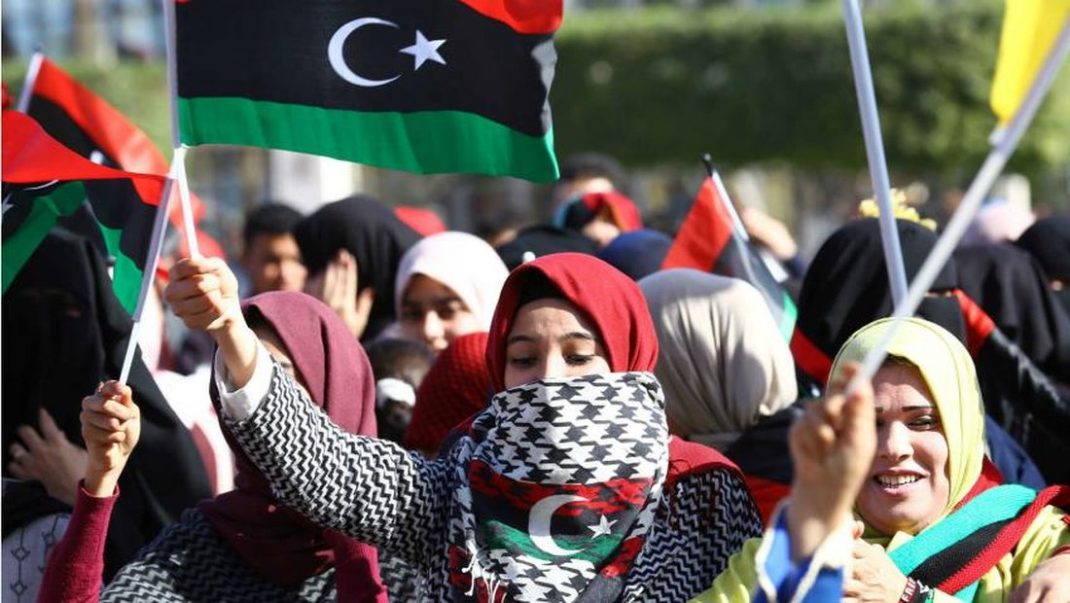 A detailed report on the risks facing Libyan women married to foreign nationals was issued by the Euro-Mediterranean Human Rights Monitor.
A detailed report on the risks facing Libyan women married to foreign nationals was issued by the Euro-Mediterranean Human Rights Monitor.
PART FOUR
4. Position of the Libyan Constitution, and international law
4.1 Constitutional position on marriage to foreign nationals
4.1.1 The 1951 Constitution
The Constitution of Libya, issued in October 1951, regulated nationality in Articles 8-9-10. The articles considered a Libyan any person born in Libya, one of whose parents were born in Libya or who lived in Libya for at least 10 years.
These articles have also stated that it is not permissible to hold Libyan along with another nationality at the same time. However, the Nationality Act No. 17 of 1954 did not contain any reference to the right to nationality for children born to Libyan women married to foreign national, nor even to their enjoyment of civil and political rights, which contravenes the Constitution.
All the provisions of the law concerning the nationality of a Libyan woman who is married to a foreigner and her children are limited to Article 8, which stipulates that a Libyan woman married to a foreigner may retain her nationality unless she wishes to acquire the nationality of her husband.
She can restore her nationality in the event of termination of the marriage and provided that she loses her foreign nationality acquired by marriage.
4.1.2 The Constitutional Declaration of 2011
The text of the Libyan Constitutional Declaration issued by the National Transitional Council in August 2011 states that men and women are equal in rights, which means that any child born to a Libyan father or mother enjoys the Libyan nationality.
Article 6 of this Declaration states that:
Libyans shall be equal before the law. They shall enjoy equal civil and political rights, shall have the same opportunities, and be subject to the same public duties and obligations, without discrimination due to religion, doctrine, language, wealth, race, kinship, political opinions, and social status, tribal or eminent or familial loyalty.
The basis, according to this article, is that the rights and duties are equal to men and women, and therefore, discrimination in the acquisition of nationality between Libyan males and females constitutes a violation of this constitutional declaration.
4.1.3 Drafts of the constitution of 2013
The constitution-drafting body, which was elected in 2013, issued three drafts (draft resolutions) on the status of children born to Libyan women married to foreigners, as follows:
– The first and second drafts:
Both have clearly and explicitly pointed out that children born to Libyan women involved in marriage relationships with non-Libyans are not to be granted the Libyan nationality.
Article 11/2 provides that: “a Libyan is a child of a Libyan father”, whereas Article 13/3 only provides that “preference shall be given to granting nationality to children of Libyan women.” Article 119/6, which relates to the right to a dignified life, stipulates that Libyan children are entitled to enjoy all the rights enjoyed by Libyan citizens, except for political rights.
– The draft consensus of the draft constitution (III):
Following a campaign led by a number of women’s rights organizations against the first and second drafts, and the demonstrations by Libyan women married to foreign nationals and their children in Tripoli and Benghazi, the draft consensus was brought to amend the article on nationality, where women married to foreign nationals could pass on their Libyan nationality to their children. This draft constitution is supposed to be voted by a public referendum soon.
4.1.4 The Draft Consensus Libyan Constitution Issued by the Elected Committee of 2017
The Libyan Parliament passed the referendum law of the third draft of the constitution, referred to above, which requires the approval of two-thirds of Libyans, and the need to win the vote of 50+1 in each of the three historical regions: Tripoli, Fezan, Berqa, so as to serve as a constitutional reference to the Libyan state. This draft became the official constitutional declaration currently in force in Libya.
The draft consensus constitution did not refer to the issue of the regulation of nationality except as stated in Article 10, which referred to “the provisions of Libyan nationality and how to acquire and withdraw them by law, taking into account considerations of national interest and maintaining the structure of population and easing integration in the Libyan society.”
This means that the Nationality Law No. 24 of 2010 does not recognize or grant the Libyan nationality to children whose mother is married to a foreigner remains in effect until the adoption of the draft as a constitution for the Libyan state after the referendum and the approval of the new legislative authorities which may amend the law to allow the application of the principle of equality correctly.
It is also suggested that the use of expressions of national interest and maintaining the structure of population and easing integration in Libyan society are loose texts that may be misused and misunderstood, resulting in the continued discrimination against Libyan mothers married to a foreign father compared with a Libyan father of any nationality.
The provisions of Article 7 of the Draft Consensus Constitution reassure that “citizens, (males and females) are equal before the law and should not be discriminated against.” All forms of discrimination are prohibited for any reason such as race, color, language, sex, birth, political opinion, disability, according to the provisions of this constitution.”
According to Article 12 of this Constitution, issued on April 19, 2016, children born to a Libyan mother married to a foreign national are considered Libyan, as regulated by the law. The same article also allowed Libyans to retain foreign nationality.
Article 12 (Nationality)
1. Every person who acquired Libyan citizenship in accordance with the provisions of the Libyan Constitution issued on 7 October 1951 and the laws passed thereunder shall be Libyan, and every person born to a Libyan father shall be Libyan.
2. Every person who acquired Libyan citizenship by law shall be Libyan.
3. Libyan nationality may be kept with another nationality.
Although it granted children the Libyan nationality, the text of this article recognizes that it discriminates between male children, who, under the first paragraph of the article, acquire citizenship by law.
That is, they acquire citizenship the moment they are born by virtue of having a Libyan father. However, female children acquire citizenship after birth, their citizenship does not have an obligatory nature and is subject to the discretionary rules determined by the legislator in the relevant law.
Article 13 of the same Constitution states that:
“The regulatory law shall take into account national interest, demographics, and the ease of integration into Libyan society when granting citizenship.”
The text of the Constitution itself retained the possibility of revoking nationality acquired by law during the next ten years of acquisition, and Article 58/6 deprived Libyans of political rights, while granting them other rights.
It is noted that this Constitution contains some contradictions, as it seeks, through its texts and in more than one Article, to show that Libyan women and men are equal and that it prohibits discrimination between them. Article 9 states that: “Male and female citizens shall be equal before the law.
There shall be no discrimination between them by way of diminishing, restricting, or depriving [of rights] in accordance with the provisions of this Constitution.”
Article 58 states:
“Women are sisters of men. The State shall be committed to supporting and caring for women, enacting laws to protect them, promoting their status in society, eliminating the negative culture and social customs that belittle their dignity, preventing discrimination against them, and ensuring accessible opportunities for them in all sectors. The State shall adopt the necessary measures to support their acquired rights.”
4.2 Position of International Law
a. Nationality is a right and no one shall ever be stateless
From a pure human rights perspective, everyone shall have a right to nationality. This was the essence of the text of Article 15 of the Universal Declaration of Human Rights (1948).
Article 24/3 of the International Covenant on Civil and Political Rights, which Libya had ratified without reservations in 1970, stipulates that: “every child has the right to acquire a nationality” and Article 3 of the same Covenant sets out the duty of States to ensure the equal right of men and women to enjoy all civil and political rights enshrined in the Covenant.
The United Nations Panel of Experts, which monitors the extent of States’ commitment to the implementation of the Covenant, stated that in order to fulfill the contractual obligations of the Covenant, Governments must ensure equality between men and women in the ability to grant citizenship to their children.
Also, Article 8 of the Convention on the Rights of the Child obligates States to respect the rights of children, represented in the preservation of identity and nationality from any unlawful interference.
Moreover, Article 7 of the same Convention emphasized the need to ensure that children born in the territory of a State have the right to acquire its nationality.
International law, in the 1961 Convention on the Reduction of Statelessness (Articles 5 and 6 thereof), completely prohibits the loss and deprivation of nationality in the context of a change in a person’s civil status, especially if that leads to statelessness. Article 7/2 of the European Convention on Nationality expressly provides for the prohibition or deprivation of nationality in the case of dependents if this leads to statelessness.
Emphasizing this trend, the 2016 annual report of the Office of the United Nations High Commissioner for Human Rights on “Human Rights and Arbitrary Deprivation of Nationality” submitted to the Human Rights Council in 2016, document A / HRC / 25/28, stated the right of the child to nationality, including access to children born in its territory who would otherwise be stateless, as well as to a person born to a citizen abroad who would be stateless without it.
“States should ensure that these guarantees enable the acquisition of citizenship for every child who would otherwise have been without citizenship as soon as possible after childbirth,” UNHCR said.
In accordance with paragraph 43 of the 2009 document by the Office of the United Nations High Commissioner for Human Rights (document A / HRC / 13/34), decisions on nationality “should be issued in writing and be open to effective administrative or judicial review” to avoid abuse in such procedures.
b. Men and women should be equal in the rights to acquire and give citizenship to their children
Articles 2 (a) and 9 of the Convention on the Elimination of All Forms of Discrimination against Women (CEDAW) affirm the need for equality between men and women.
They also stress need for incorporating this principle into their laws, including equality in the right to acquire nationality and to grant citizenship to their children.
The Convention obliges States to grant women equal rights in terms of acquisition, retention or change of nationality, which is the same provision contained in the The Protocol to the African Charter on Human and Peoples’ Rights on the Rights of Women in Africa (or The Maputo Protocol), which Libya has ratified.
Article 9/2 of the Convention on the Elimination of All Forms of Discrimination against Women stipulates that States Parties shall grant women equal rights with men with respect to the nationality of their children Libya has ratified the Convention on the Elimination of All Forms of Discrimination against Women (CEDAW), but has made formal reservations to exempt itself from certain provisions of the Convention, including reservations to Article 2 on combating discrimination in all its forms.
However, the United Nations Panel of Experts on the Implementation of the Convention said that reservations to these articles were not permitted under the provisions of the Convention and called on Libya to grant equal rights to men and women, including by amending the Nationality Code.
c. Depriving the mother’s children of their nationality deprives them of the right to enjoy other basic rights
The danger of not granting citizenship to children has also to do with the serious impact to their enjoyment of the right to free education, health services, work and residence.
It also causes the lack of access to aid that may be available to nationals, and sometimes from irregular forced labor, let alone being exploited by their employers, and the lack of protection enjoyed by citizens outside their own countries.
In some cases, especially in the case of divorce, children are subjected to unendurable suffering because they do not have the nationality of any country, especially if they grow up in their mother’s country. They find themselves in that country where they grew up without having their nationality, and if they want to join universities they are treated as foreign nationals regarding admission and fees.
Then, if they want to join the labor market, they face huge problems, including the need to obtain permission to work as foreigners. If such a permit is issued, it would be temporary as it is known in such cases and would need to be renewed every now and then.
In addition, they are faced with difficulties obtaining residence in the country, and the need to renew their residency from time to time, not to mention the obstacles they face when traveling with their mother as non-nationals (stateless).
Recommendations
The Euro-Mediterranean Human Rights Monitor calls on the Libyan authorities to:
– Amend the Marriage Law between non-Libyans and Libyans (No. 15 of 1984) to guarantee the right of Libyan women and their freedom to choose their partner in accordance with the international conventions ratified by Libya.
– Set conditions for foreign nationals wishing to marry a Libyan woman, such as a certain period of stay in Libya without interruption, in order to dispel community fears of marriage to non-Libyans. This could also be referred to the security services to learn about their status in their countries of origin before they get married to Libyan women. Also, the Libyan authorities are urged to amend regulations specific to acquiring the permission of the Ministry of Social Affairs by setting specific conditions for disapproval to avoid arbitrary measures.
– Work on amending the Nationality Law No. 24 of 2010, so that children born to Libyan women married to foreign nationals can enjoy their right to nationality.
– Settle the legal status of any Libyan married to a foreigner and to ensure full rights for their children.
END
***
The Euro-Mediterranean Human Rights Monitor is a youth-led independent, nonprofit organization that advocates for the human rights of all persons across Europe and the MENA region, particularly those who live under occupation, in the throes of war or political unrest and/ or have been displaced due to persecution or armed conflict.
____________





